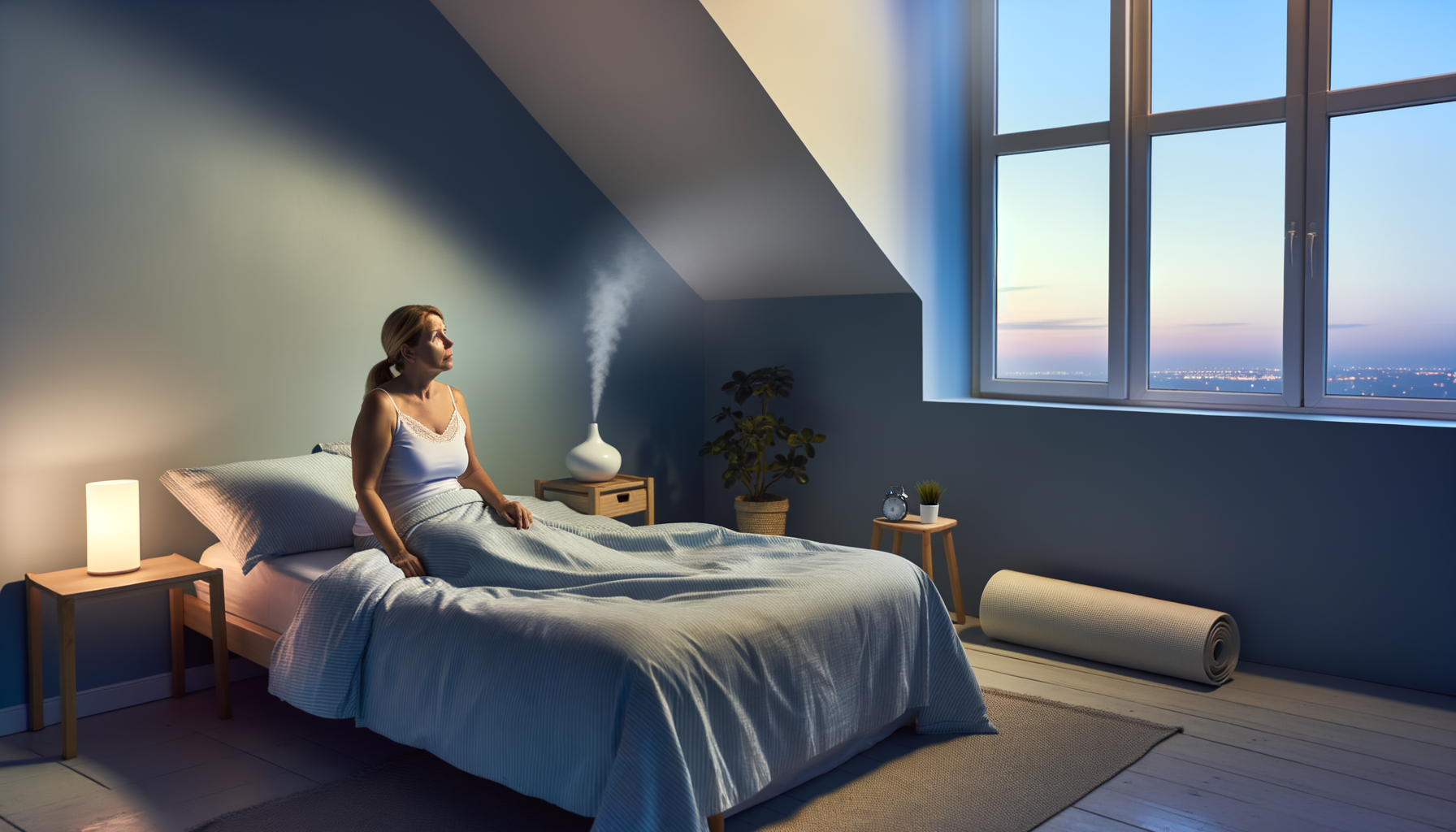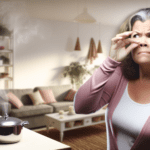Early Waking and Menopause
Early waking refers to the phenomenon of waking up significantly earlier than intended or desired, often without the ability to return to sleep. This can lead to a cumulative sleep deficit, affecting overall well-being and functioning. In the context of menopause, early waking is a common complaint, with many women reporting a consistent pattern of premature morning arousal.
The Connection Between Menopause and Sleep Disturbances
Menopause is a natural biological process marked by the end of menstrual cycles, typically occurring in women in their 40s or 50s. It is during this transition that many experience sleep disturbances, including early waking. These disturbances are often linked to the hormonal changes characteristic of menopause, such as fluctuations in estrogen and progesterone levels.
Physiological and Psychological Causes of Early Waking
The causes of early waking during menopause are multifaceted. Physiologically, changes in hormone levels can disrupt the body’s internal clock, or circadian rhythm, leading to altered sleep patterns. Psychologically, menopause can bring about increased stress, anxiety, and mood changes, further contributing to sleep disruption. Additionally, other menopausal symptoms, such as hot flashes and night sweats, can cause women to wake up earlier than desired.
The Impact of Hormonal Fluctuations on Sleep
Hormonal fluctuations play a significant role in sleep quality during menopause. Estrogen is known to promote sleep by interacting with neurotransmitter systems that regulate the sleep-wake cycle. Progesterone has a natural sedative effect, contributing to the quality of sleep. As these hormone levels decline during menopause, women may experience a decrease in sleep quality, including difficulties in maintaining sleep and early waking.
In summary, early waking is a common issue for menopausal women, influenced by both physiological changes, such as hormonal fluctuations, and psychological factors, including stress and mood disturbances. Understanding these connections is crucial for addressing and managing sleep problems during this stage of life.
The Prevalence of Sleep Issues in Menopausal Women
Statistical Overview of Sleep Problems
Menopause, a natural biological process marking the end of a woman’s reproductive years, is often accompanied by a variety of symptoms, including sleep disturbances. Studies have consistently shown a significant prevalence of sleep issues among menopausal women. For instance, research by Bairy et al. [17] in India reported that 51.7% of postmenopausal women experienced difficulty in sleeping. Similarly, Fallahzadeh [18] in Iran found that 54.3% of postmenopausal women had difficulties sleeping. These statistics highlight the widespread nature of sleep problems during this life stage, with a notable impact on the quality of life for many women.
Personal Accounts and Studies
Personal accounts from menopausal women often echo the findings of statistical studies, with many reporting early waking and disrupted sleep patterns. Anecdotal evidence and qualitative research provide insight into the personal impact of these sleep disturbances. For example, narratives collected in studies like those conducted by Mondi Farsani et al. [4] and Rahman et al. [19] reveal the extent to which sleep issues can affect daily functioning, mood, and overall well-being.
Comparing Menopausal Sleep Disturbances with Other Life Stages
When comparing sleep disturbances experienced during menopause with other life stages, it becomes evident that menopausal women face unique challenges. Research indicates that the incidence of sleep disorders increases significantly during the menopausal transition. For instance, Waidyasekera et al. [21] reported a higher prevalence of sleep problems in postmenopause (51.1%) compared to premenopause (29.2%). This comparison underscores the particular vulnerability of menopausal women to sleep issues, likely due to hormonal fluctuations and other physiological changes.
In conclusion, sleep issues are a common and significant concern for menopausal women, with a high prevalence reported across various studies and personal accounts. These disturbances not only affect nighttime rest but also have broader implications for health and quality of life. Understanding the scope and impact of sleep problems during menopause is crucial for developing effective management strategies and providing support to those affected.

Bette 100% All-Natural Relaxing Lavender Body Lotion.
Chemical-Free
Your relaxing night time body moisturizer to leave the day’s stress behind. Decompress and wish your body good night with the calming scent of lavender.
Natural Management of Early Waking
Light Therapy and Its Benefits
Light therapy, also known as phototherapy, involves exposure to specific wavelengths of light to help regulate the body’s internal clock, which can be particularly beneficial for menopausal women experiencing early waking. By exposing oneself to bright light during the late afternoon and early evening, it’s possible to shift the circadian rhythm and improve sleep quality. Home light therapy units are available and can be used for two to three hours in the evening to mimic the effects of natural sunlight, potentially leading to longer and more restful sleep.
Meditation Techniques for Better Sleep
Meditation has been shown to reduce stress hormone levels, which can interfere with sleep. Techniques such as guided meditation and mindfulness can be particularly helpful for those new to the practice. By focusing on the breath and allowing thoughts to pass without judgment, meditation can calm the mind and prepare the body for sleep, making it a powerful tool for combating early waking during menopause.
The Role of Yoga and Tai Chi in Improving Sleep
Yoga and Tai Chi are gentle forms of exercise that combine physical postures, breathing techniques, and meditation. These practices can help alleviate symptoms of insomnia by reducing stress, improving physical functioning, and promoting relaxation. Research suggests that regular participation in yoga or Tai Chi can lead to better sleep quality and longer sleep duration for menopausal women struggling with early waking.
Aromatherapy and Essential Oils for Sleep
Aromatherapy involves the use of essential oils to promote health and well-being, with several oils being recognized for their sleep-inducing properties. Oils such as chamomile, lavender, patchouli, and ylang-ylang can be used in diffusers or applied topically to help soothe the mind and body, potentially reducing the occurrence of early waking. While scientific evidence is limited, many individuals report improved sleep quality with the use of aromatherapy.
Dietary Adjustments and Nutrients That Promote Sleep
Diet plays a crucial role in sleep quality. To manage early waking, it’s advisable to limit or avoid alcohol and caffeine, especially in the hours leading up to bedtime. Additionally, consuming foods rich in tryptophan, magnesium, and certain vitamins can promote the production of sleep-regulating hormones like melatonin and serotonin. Foods such as turkey, wheat germ, sunflower seeds, bananas, almonds, cashews, whole grains, dark leafy greens, and legumes can be incorporated into the diet to support better sleep.
In conclusion, natural management strategies for early waking during menopause can be highly effective. Incorporating light therapy, meditation, yoga or Tai Chi, aromatherapy, and dietary adjustments into one’s routine can significantly improve sleep quality without the need for pharmaceutical interventions. These approaches offer a holistic way to address the sleep disturbances that often accompany menopause.

From unhappy, dry, and sandpaper to silky, smooth and feeling good. That’s Cleo. Cleo is a 100% natural labial balm to moisture and soothe “your other lips”. Cleo is chemical-free, water-free, pH optimized and helps maintain and restore your delicate labial skin’s natural flora. Ideal for daily use or as needed. Get the most silky, lovable lips ever.
Supplements and Herbal Remedies
Magnesium as a Natural Sedative
Magnesium, an essential mineral for numerous bodily functions, also plays a pivotal role in sleep regulation. Often referred to as the “relaxation mineral,” magnesium contributes to calming the nervous system and preparing the body for restful sleep. It is particularly beneficial for menopausal women who may experience sleep disturbances due to hormonal changes. Magnesium can help to improve sleep quality, especially in those with poor sleep patterns, by maintaining healthy levels of GABA, a neurotransmitter that promotes sleep. Moreover, it has been shown to alleviate symptoms of mild-to-moderate anxiety and depression, which can further contribute to early waking and sleep disruption during menopause.
Herbal Teas and Supplements for Sleep
Herbal remedies have been used for centuries to promote relaxation and sleep. Valerian root is widely recognized for its sedative properties and is often used to improve sleep quality and reduce the time it takes to fall asleep. Chamomile, with its calming effects, is another popular choice for managing insomnia and anxiety. Lemon balm and passionflower are also notable for their ability to soothe the nervous system and encourage a more restful sleep. These herbs can be consumed as teas or in supplement form, providing a natural alternative to pharmaceutical sleep aids.
Efficacy and Safety of Herbal Remedies
While herbal remedies are generally considered safe and have been used traditionally for sleep improvement, it is important to approach their use with caution. The efficacy of these remedies can vary from person to person, and scientific evidence supporting their use is often mixed. It is crucial to source high-quality products and consult with a healthcare provider, particularly for women in menopause, to ensure that these supplements do not interact with other medications or exacerbate health conditions. Additionally, some herbs may have side effects or require specific dosage guidelines to ensure safety and effectiveness.
The Influence of Sound on Sleep Quality
Music Therapy for Sleep Improvement
Music therapy has emerged as a promising intervention for sleep improvement, particularly among menopausal women experiencing early waking. The therapeutic use of music can induce relaxation, reduce stress, and facilitate the transition into deep sleep. By selecting specific genres or compositions that promote calmness, such as classical or ambient music, individuals can create a conducive auditory environment for sleep. The tempo, rhythm, and volume of the music are critical factors; slow, soft, and rhythmic sounds are typically most effective in enhancing sleep quality.
Types of Music and Their Effects on Sleep
- Classical Music: Often characterized by a slow tempo and lack of lyrics, classical music can significantly lower heart rate and blood pressure, leading to physical relaxation and sleepiness.
- Ambient Music: With its atmospheric and texture-based soundscapes, ambient music creates a soothing background that can mask disruptive noises and calm an overactive mind.
- Nature Sounds: Recordings of rain, ocean waves, or forest sounds mimic the natural environment, potentially enhancing sleep by providing a sense of security and tranquility.
Understanding the Science Behind Sound and Sleep
The influence of sound on sleep quality is rooted in the science of psychoacoustics, which explores how the brain perceives and processes auditory stimuli. Certain sounds, known as pink noise, have been found to regulate brain waves, promoting the stabilization of sleep cycles. This can be particularly beneficial for menopausal women, whose sleep patterns are often disrupted by hormonal changes. Additionally, the release of neurochemicals such as dopamine and serotonin in response to pleasurable music can further enhance the quality of sleep by reducing anxiety and creating a positive state of mind.
In conclusion, the strategic use of sound, whether through music therapy or the selection of specific types of music, holds significant potential for improving sleep quality among menopausal women. By understanding the underlying science and carefully curating the auditory environment, individuals can harness the power of sound to combat early waking and achieve restorative sleep.

Popular Read
When to Seek Professional Help
Identifying Signs That Require Medical Attention
While many women experience sleep disturbances during menopause, certain signs indicate it may be time to seek professional help. These signs include:
- Persistent Insomnia: Difficulty falling asleep or staying asleep that lasts for several weeks.
- Excessive Daytime Sleepiness: Feeling overwhelmingly drowsy during the day, which may affect your ability to function.
- Snoring and Breathing Issues: Loud snoring or observed pauses in breathing during sleep could suggest sleep apnea.
- Restless Legs: Uncomfortable sensations in the legs accompanied by a strong urge to move them, particularly at night.
- Mood Disturbances: Increased irritability, depression, or anxiety that may be linked to sleep problems.
- Cognitive Impairment: Memory issues or decreased concentration that may result from poor sleep quality.
- Severe Hot Flashes and Night Sweats: Intense episodes that frequently disrupt sleep and are resistant to home management strategies.
If these symptoms are familiar and lifestyle changes have not improved your sleep, it’s important to consult a healthcare provider.
Possible Underlying Medical Conditions
Several medical conditions can exacerbate sleep issues during menopause, including:
- Sleep Apnea: A disorder characterized by pauses in breathing or shallow breaths during sleep.
- Restless Legs Syndrome (RLS): A neurological disorder that causes uncomfortable sensations and an urge to move the legs.
- Mental Health Disorders: Conditions such as depression and anxiety can significantly impact sleep quality.
- Primary Ovarian Insufficiency (POI): A condition where the ovaries stop functioning before the age of 40, which may affect sleep.
- Thyroid Disorders: Both hyperthyroidism and hypothyroidism can cause sleep disturbances.
- Chronic Pain Conditions: Disorders like arthritis or fibromyalgia can make it difficult to find a comfortable sleeping position.
Identifying and treating these conditions can be crucial in restoring sleep quality.
What to Expect During a Medical Consultation
When you decide to seek professional help, here’s what you can typically expect during a medical consultation:
- Medical History Review: Your doctor will ask about your sleep patterns, menopausal symptoms, and overall health.
- Physical Examination: A general check-up to identify any physical signs that could be related to sleep disturbances.
- Sleep Assessment: You may be asked to keep a sleep diary or undergo a sleep study to monitor your sleep cycles and behaviors.
- Blood Tests: These may be conducted to check hormone levels, thyroid function, and other potential issues.
- Discussion of Treatment Options: Based on the findings, your doctor may suggest lifestyle changes, medication, therapy, or other interventions.
- Referrals: If necessary, you might be referred to a specialist, such as a sleep doctor, endocrinologist, or mental health professional.
Remember, seeking help is a positive step towards improving your sleep and overall well-being during menopause.
Conclusion: Embracing Lifestyle Changes for Better Sleep
Throughout the menopausal transition, women may experience a range of sleep disturbances, including early waking. To manage this, key strategies include maintaining a consistent sleep schedule, creating a restful sleep environment, and engaging in relaxation techniques before bed. It’s also beneficial to limit exposure to screens and bright lights in the evening, as well as to avoid heavy meals, caffeine, and alcohol close to bedtime. Regular physical activity can promote better sleep, but it should be timed earlier in the day to prevent overstimulation before bedtime.
The Importance of Consistency and Patience
Implementing lifestyle changes to improve sleep during menopause is not a quick fix but rather a gradual process that requires consistency and patience. It’s important to stick to new routines, such as a fixed wake-up time and a calming pre-sleep ritual, to allow the body’s internal clock to adjust. Patience is key, as it may take several weeks to notice improvements in sleep patterns. Tracking sleep can also be helpful in identifying patterns and progress over time.
Encouragement for Ongoing Efforts and Adaptation
As women navigate the menopausal transition, it’s crucial to stay encouraged and adaptable. If certain strategies are not effective, it may be necessary to try different approaches or seek professional advice. Support from healthcare providers, sleep specialists, and peer support groups can provide additional resources and motivation. Remember, the efforts to improve sleep are not only about managing early waking but also about enhancing overall well-being and quality of life during this significant life stage.









